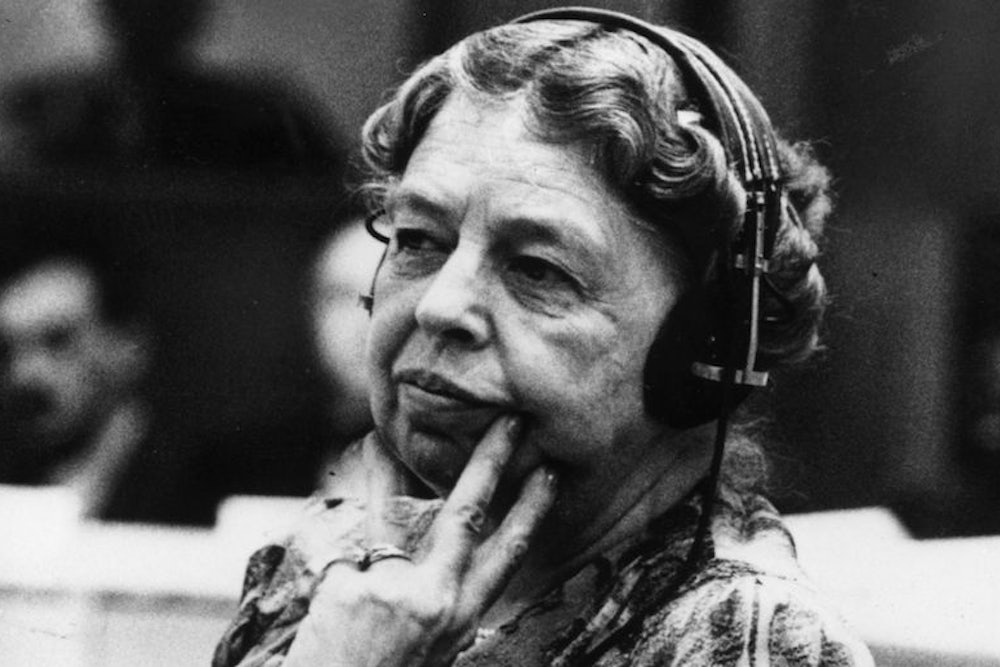Mrs. Eleanor Roosevelt is a dedicated humanitarian and her view of a political problem is usually composed of social and moral ingredients, offering up, as it were, a contribution to the values of Point Four and the United Nations. As a former UN delegate, she knows what she is after—and she proceeds to give us a warm survey of her far-flung journey into Point Four and the many other sore points currently facing the world of the East.
In this book, which started out as a courtesy call on Prime Minister Nehru, Mrs. Roosevelt sets herself a goal—an examination of the social scourges enveloping the Middle East, Pakistan and India. En route, she called at Syria, Lebanon and Jordan, where she paused long enough to analyze the social and political soil of the backward Arab world, and her report does not skim over the harsh facts of reality. Prosperity can come when the Arab leaders decide that they can and will live in peace with the more modern state of Israel.
Leaving Jordan, Mrs. Roosevelt goes on a six-day fact-hunting safari in Israel, giving us a capsule review of what Israel has done and what she still faces. Sympathetic to Israel's goal, yet alert to ail the human problems facing 800,000 Arab refugees, Mrs. Roosevelt places the solution into the hands of the irrational Arab League. Her facts are basic, for she sees things without the rosy glow of the accompanying propagandists. Poverty is not a religious necessity, nor does it cleanse the spirit. Water-power and modern means, she says, can do much more for man in the dry deserts than a continued feudal outlook, and she gets to the nub of the problem with expeditious charrm and dignity.
The invitation to Pakistan, next on the investigator's itinerary, came from the All Pakistan Women's Association, offering Mrs. Roosevelt a chance to survey the role of women in the new political age of partitioned Pakistan. Partition from India brought with it many evils, splitting the economies of both countries into painful segments. India retained most of its physical assets but lost its farm lands, and Pakistan, a jute producing country, found the jute mills on the Indian side of the partition line. The balances, such as they were, were mostly religious and spiritual, for partition also divided the subcontinent's ability to defend itself against Communism. Also, two standing armies, each ready to war against the other, have eaten up resources that could have been put to better use. Yet Pakistan is growing, despite purdah, the Moslem code for calling women inferior beings.
Half of the book is devoted to India, for this was Mrs. Roosevelt's prime reason for her journey abroad. India, accused of being everything to everybody, has universal suffrage, a terrible infant mortality rate, and is in the trying position of acting as a buffer between Russia and the West. Mrs. Roosevelt trekked across India, saw the old and the very new, the country's progress and its poverty; but she plays it fair when she pays it out on both sides. The United States, she says, has inherited the criticism once placed against England, though ex-Ambassador Bowles did a yeoman's job in public relations. His children, wisely, went to an Indian school, cycling there, and the Ambassador went far and wide as a man of good-will, trying to help India develop democratic values.
India's two main problems, continues Mrs. Roosevelt, are still food and the ever-increasing population, enough to swamp a going country ever under the threat of neighboring Communism. The UN and American-financed agencies are working and planning to help make India self-sufficient and healthy, to stabilize the population, a problem that is as vast as it is real.
Mrs. Roosevelt's very human document joins with Governor Dewey's and succeeds in establishing a sound evaluation of the huge questions facing the East, adding to our common understanding of India's and America's roles today.
